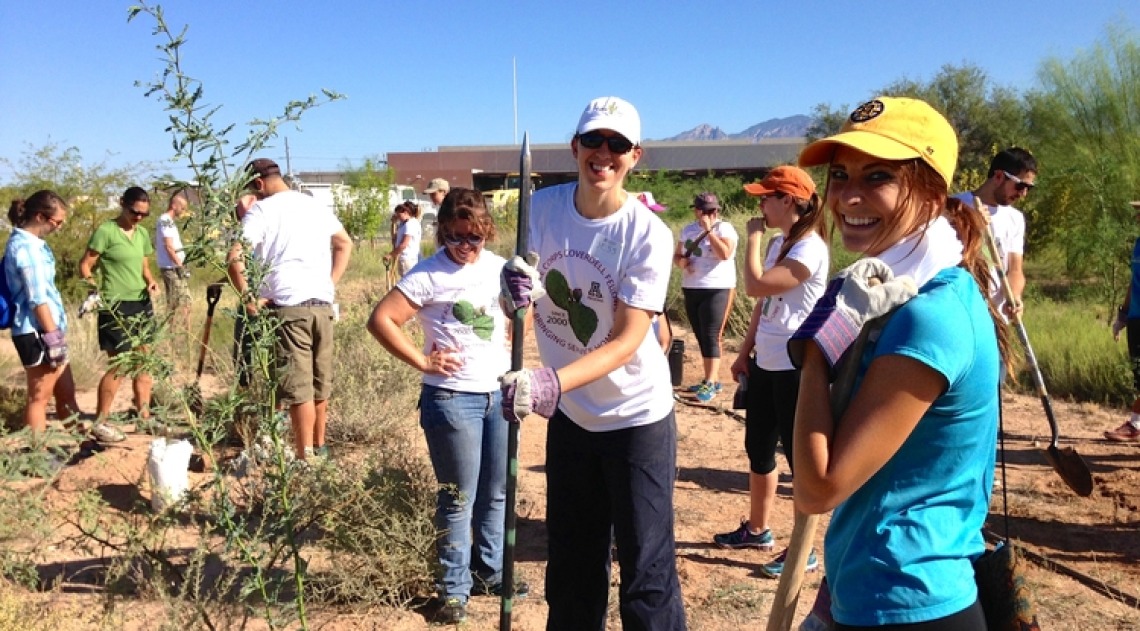Returned Peace Corps Volunteers Turn Focus Locally

As home to one of the largest Paul D. Coverdell Fellows programs in the country, the UA benefits from Peace Corps volunteers bringing back valuable experiences in more than 50 countries.
 For 15 years, students at the University of Arizona involved with the Paul D. Coverdell Fellows Program have helped to build and revitalize communities in Southern Arizona.
For 15 years, students at the University of Arizona involved with the Paul D. Coverdell Fellows Program have helped to build and revitalize communities in Southern Arizona.
The UA is home to one of the largest Coverdell Fellow programs in the nation. Since the start of the academic year, 84 Coverdell Fellows have started the program and returned for graduate studies after their service in the U.S. Peace Corps. All told, that group has provided 22,228 hours of service to benefit underserved communities in Southern Arizona and another 846 hours in collective service projects.
"The Peace Corps Coverdell Program is a recruitment draw and a winning program for the university and the community," said Georgia Ehlers, director of the UA Office of Fellowships and Community Engagement, who directs the fellows program.
As fellows, UA students provide service in an underserved community through internships, jobs or research while working on master's or doctoral degrees. Since 2000, more than 330 returned Peace Corps volunteers have entered graduate school at the UA in programs in 11 colleges and 45 different academic programs.
"Returned Peace Corps volunteers add a wealth of cultural diversity in their home academic departments, are leaders in their student communities, and have made a long-term positive impact within the larger community," Ehlers said. "The internships have led to exciting jobs at graduation, and we’re especially delighted that so many alumni have remained in Arizona taking on leadership positions at a variety of organizations."
Frank Zadroga, a doctoral student in the UA's Department of Teaching, Learning & Sociocultural Studies with a focus on environmental learning, served as a Peace Corps member in Colombia and Costa Rica during the 1970s. He has spent three semesters serving as a UA Coverdell Fellow and AmeriCorps volunteer at Manzo Elementary School.
At Manzo, Zadroga is involved in the school's Ecology and School Garden team, which works to reconnect children with nature. He teaches children about chicken husbandry, having been born and raised on a chicken farm. His dissertation research focuses on ways children learn about sustainability while working in a garden space.
"Barrio Hollywood, where Manzo is located, is very supportive of school activities and many families already have gardens and chickens," Zadroga said, adding that there are plans to soon launch the "Cluck Club" as a way of improving education and strengthening the bonds between the school and the community. "We hope to hatch two dozen eggs and begin to generate family flocks around the Barrio."
As noted in the UA Graduate College's "Report on Civic Engagement, Community Service, Social Accounting and Economic Impact: 2000-2015," 655 active Coverdell Fellows at the UA gave 323,450 hours of volunteer service worth over $6.5 million dollars of economic impact.
Samuel Packard, a master's student studying epidemiology at the UA Mel and Enid Zuckerman College of Public Health, works with the Alitas Program. A program of Catholic Community Services of Southern Arizona, the program supports asylum-seekers who otherwise would have little or no support in becoming reunited with their families as they enter the United States.
"This volunteer work has made my graduate student experience much more meaningful and significant, and a contrast with my field of study which can often be very quantitative and data driven," said Packard, who served as a Peace Corps volunteer in Panama, then as a Peace Corps Response volunteer in Guatemala.
"The Fellows program encouraged me to reach beyond my studies and be involved in the community on a person-to-person basis," Packard said. "I've been volunteering with this program for over a year and gaining that human understanding of problems at the border has complemented my studies in a very important way."

